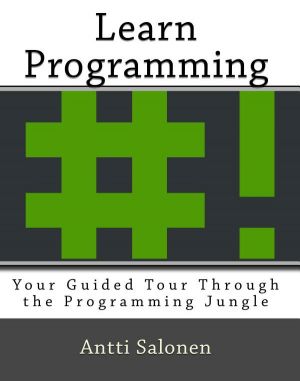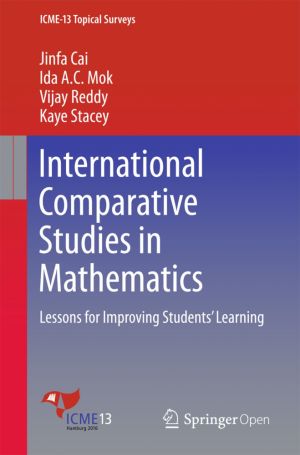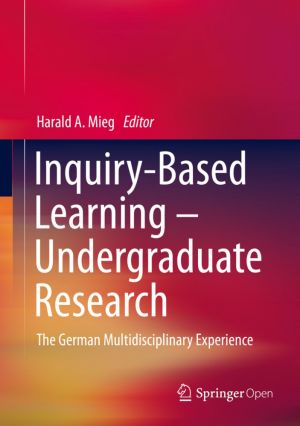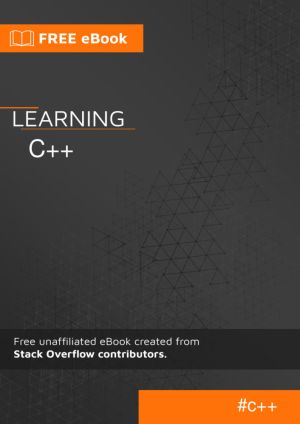Learning C++
by Stack Overflow Community
DescriptionTable of ContentsDetailsHashtagsReport an issue 






Book Description
C++ is a general-purpose programming language as an extension of the C programming language, or "C with Classes". It is an unofficial and free C++ ebook created for educational purposes. All the content is extracted from Stack Overflow Documentation, which is written by many hardworking individuals at Stack Overflow.This open book is licensed under a Creative Commons License (CC BY-SA). You can download Learning C++ ebook for free in PDF format (5.3 MB).
Table of Contents
Chapter 1
Getting started with C++
Chapter 2
Alignment
Chapter 3
Argument Dependent Name Lookup
Chapter 4
Arithmitic Metaprogramming
Chapter 5
Arrays
Chapter 6
Atomic Types
Chapter 7
Attributes
Chapter 8
auto
Chapter 9
Basic input/output in c++
Chapter 10
Basic Type Keywords
Chapter 11
Bit fields
Chapter 12
Bit Manipulation
Chapter 13
Bit Operators
Chapter 14
Build Systems
Chapter 15
C incompatibilities
Chapter 16
C++ Containers
Chapter 17
C++ Debugging and Debug-prevention Tools & Techniques
Chapter 18
C++ function "call by value" vs. "call by reference"
Chapter 19
C++ Streams
Chapter 20
C++11 Memory Model
Chapter 21
Callable Objects
Chapter 22
Classes/Structures
Chapter 23
Client server examples
Chapter 24
Common compile/linker errors (GCC)
Chapter 25
Compiling and Building
Chapter 26
Concurrency With OpenMP
Chapter 27
Const Correctness
Chapter 28
const keyword
Chapter 29
Constant class member functions
Chapter 30
constexpr
Chapter 31
Copy Elision
Chapter 32
Copying vs Assignment
Chapter 33
Curiously Recurring Template Pattern (CRTP)
Chapter 34
Data Structures in C++
Chapter 35
Date and time using header
Chapter 36
decltype
Chapter 37
Design pattern implementation in C++
Chapter 38
Digit separators
Chapter 39
Enumeration
Chapter 40
Exceptions
Chapter 41
Explicit type conversions
Chapter 42
Expression templates
Chapter 43
File I/O
Chapter 44
Floating Point Arithmetic
Chapter 45
Flow Control
Chapter 46
Fold Expressions
Chapter 47
Friend keyword
Chapter 48
Function Overloading
Chapter 49
Function Template Overloading
Chapter 50
Futures and Promises
Chapter 51
Header Files
Chapter 52
Implementation-defined behavior
Chapter 53
Inline functions
Chapter 54
Inline variables
Chapter 55
Internationalization in C++
Chapter 56
Iteration
Chapter 57
Iterators
Chapter 58
Keywords
Chapter 59
Lambdas
Chapter 60
Layout of object types
Chapter 61
Linkage specifications
Chapter 62
Literals
Chapter 63
Loops
Chapter 64
Memory management
Chapter 65
Metaprogramming
Chapter 66
More undefined behaviors in C++
Chapter 67
Move Semantics
Chapter 68
mutable keyword
Chapter 69
Mutexes
Chapter 70
Namespaces
Chapter 71
Non-Static Member Functions
Chapter 72
One Definition Rule (ODR)
Chapter 73
Operator Overloading
Chapter 74
operator precedence
Chapter 75
Optimization
Chapter 76
Optimization in C++
Chapter 77
Overload resolution
Chapter 78
Parameter packs
Chapter 79
Perfect Forwarding
Chapter 80
Pimpl Idiom
Chapter 81
Pointers
Chapter 82
Pointers to members
Chapter 83
Polymorphism
Chapter 84
Preprocessor
Chapter 85
Profiling
Chapter 86
RAII: Resource Acquisition Is Initialization
Chapter 87
Random number generation
Chapter 88
Recursion in C++
Chapter 89
Recursive Mutex
Chapter 90
Refactoring Techniques
Chapter 91
References
Chapter 92
Regular expressions
Chapter 93
Resource Management
Chapter 94
Return Type Covariance
Chapter 95
Returning several values from a function
Chapter 96
RTTI: Run-Time Type Information
Chapter 97
Scopes
Chapter 98
Semaphore
Chapter 99
SFINAE (Substitution Failure Is Not An Error)
Chapter 100
Side by Side Comparisons of classic C++ examples solved via C++ vs C++11 vs C++14 vs C++17
Chapter 101
Singleton Design Pattern
Chapter 102
Smart Pointers
Chapter 103
Sorting
Chapter 104
Special Member Functions
Chapter 105
Standard Library Algorithms
Chapter 106
static_assert
Chapter 107
std::any
Chapter 108
std::array
Chapter 109
std::atomics
Chapter 110
std::forward_list
Chapter 111
std::function: To wrap any element that is callable
Chapter 112
std::integer_sequence
Chapter 113
std::iomanip
Chapter 114
std::map
Chapter 115
std::optional
Chapter 116
std::pair
Chapter 117
std::set and std::multiset
Chapter 118
std::string
Chapter 119
std::variant
Chapter 120
std::vector
Chapter 121
Storage class specifiers
Chapter 122
Stream manipulators
Chapter 123
Templates
Chapter 124
The ISO C++ Standard
Chapter 125
The Rule of Three, Five, And Zero
Chapter 126
The This Pointer
Chapter 127
Thread synchronization structures
Chapter 128
Threading
Chapter 129
Trailing return type
Chapter 130
type deduction
Chapter 131
Type Erasure
Chapter 132
Type Inference
Chapter 133
Type Keywords
Chapter 134
Type Traits
Chapter 135
Typedef and type aliases
Chapter 136
Undefined Behavior
Chapter 137
Unions
Chapter 138
Unit Testing in C++
Chapter 139
Unnamed types
Chapter 140
Unspecified behavior
Chapter 141
User-Defined Literals
Chapter 142
Using declaration
Chapter 143
Using std::unordered_map
Chapter 144
Value and Reference Semantics
Chapter 145
Value Categories
Chapter 146
Variable Declaration Keywords
Chapter 147
Virtual Member Functions
Book Details
Title
Learning C++
Subject
Computer Science
Publisher
RIP Tutorial
Published
2019
Pages
897
Edition
1
Language
English
PDF Size
5.3 MB
License

Related Books

This book is aimed at readers who are interested in software development but have very little to no prior experience. The book focuses on teaching the core principles around software development. It uses several technologies to this goal (e.g. C, Python, JavaScript, HTML, etc.) but is not a book about the technologies themselves. The reader will le...

This book presents a synopsis of six emerging themes in adult mathematics/numeracy and a critical discussion of recent developments in terms of policies, provisions, and the emerging challenges, paradoxes and tensions. It also offers an extensive review of the literature adult mathematics education. Why do adults want to learn mathematics? Did they...

This book summarizes the vast amount of research related to teaching and learning probability that has been conducted for more than 50 years in a variety of disciplines. It begins with a synthesis of the most important probability interpretations throughout history: intuitive, classical, frequentist, subjective, logical propensity and axiomatic vie...

It argues that the main purpose of educational research is to improve student learning, and that international comparative studies are no exception....

This book provides a systematic overview of experiences with Inquiry-Based Learning (IBL) and undergraduate research (UR) in German universities, covering both research universities (Universitäten) and universities of applied sciences (Fachhochschulen). Divided into three parts, the book starts with the principles and common practices of IBL/UR at...

This book deals with the relevance of recognition and validation of non-formal and informal learning in education and training, the workplace and society. In an increasing number of countries, it is at the top of the policy and research agenda ranking among the possible ways to redress the glaring lack of relevant academic and vocational qualificat...

